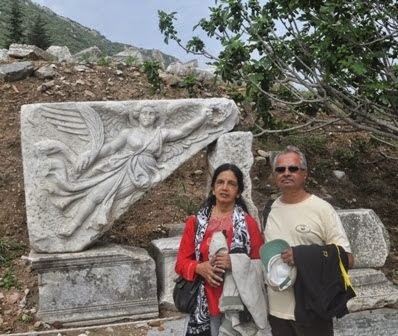Punyashlok Rajmata Ahilyabai Holkar (31 May 1725-13 August 1795) ruled from 11th December 1767 to 13 August 1795 was also known as the Philosopher Queen. She was a Holkar dynasty Queen of the Malwa Kingdom in Central India.
Ahilyabai was born on May 31, 1725 in the village of Chaundi, in the present-day Ahmednagar district in Maharashtra. Her father, Mankoji Shinde, was the patil of the village, a member of the proud Dhangar community. Women then did not go to school, but Ahilyabai's father taught her to read and write.
Her entrance on to the stage of history was something of an accident. Malhar Rao Holkar, a commander in the service of the Peshwa Bajirao and Lord of the Malwa territory, stopped in Chaundi on his way to Pune and, according to legend, saw the eight-year-old Ahilyabai at the temple service in the village. Recognising her piety and her character, he brought the girl to the Holkar territory as a bride for his son, Khanderao (1723–1754). She was married to Khanderao in 1733.
Ahilya Bai’s husband Khanderao was killed during the siege of Kumbher in 1754. Twelve years later, her father-in-law, Malharrao died. Malharrao was succeeded by Malerao, the only son of Khanderao, but he also died on 5 April 1767. From 1767 until her death in 1795, she ruled Malwa, trained in both administrative and military matters by Malhar Rao.
Already trained to be a ruler, Ahilyabai petitioned the Peshwa after Malhar’s death, and the death of her son, to take over the administration herself. Some in Malwa objected to her assumption of rule, but the army of Holkar was enthusiastic about her leadership. She had led them in person, with four bows and quivers of arrows fitted to the corners of the howdah of her favourite elephant. The Peshwa granted her permission on 11 December 1767, and, with Subhedar Tukojirao Holkar (Malharrao's adopted son) as the head of military matters, she proceeded to rule Malwa in a most enlightened manner, even reinstating a Brahmin who had opposed her. Ahilyabai never observed purdah but held daily public audience and was always accessible to anyone who needed her ear.
Among Ahilyabai's accomplishments was the development of Indore from a small village to a prosperous and beautiful city; her own capital, however, was in nearby Maheshwar, a town on the banks of the Narmada river. She also built forts and roads in Malwa, sponsored festivals and gave donations for regular worship in many Hindu temples. Outside Malwa, she built dozens of temples, ghats, wells, tanks and rest-houses across an area stretching from the Himalayas to pilgrimage centres in South India. The Bharatiya Sanskritikosh lists as sites she embellished, Kashi, Gaya, Somnath, Ayodhya, Mathura, Hardwar, Kanchi, Avanti, Dwarka, Badrinarayan, Rameshwar and Jaganathpuri. Ahilyadevi also rejoiced when she saw bankers, merchants, farmers and cultivators rise to levels of affluence, but did not consider that she had any legitimate claim to any of that wealth, be it through taxes or feudal right. She must, in fact, have financed all her activities with the lawful gains obtained from a happy and prosperous land.
Ahilyabai’s capital at Maheshwar was the scene of literary, musical, artistic and industrial enterprise. She entertained the famous Marathi poet, Moropant and the shahir, Anantaphandi from Maharashtra, and also patronised the Sanskrit scholar, Khushali Ram. Craftsmen, sculptors and artists received salaries and honours at her capital, and she even established a textile industry in the city of Maheshwar.
Historians of the 19th and 20th centuries—Indian, English and American agree that the reputation of Ahilyabai Holkar in Malwa and Maharashtra was then, and is, even now, that of a saint. Nothing has ever been discovered by any researcher to discredit that. She was truly a magnificent woman, an able ruler and a great queen.

No comments:
Post a Comment